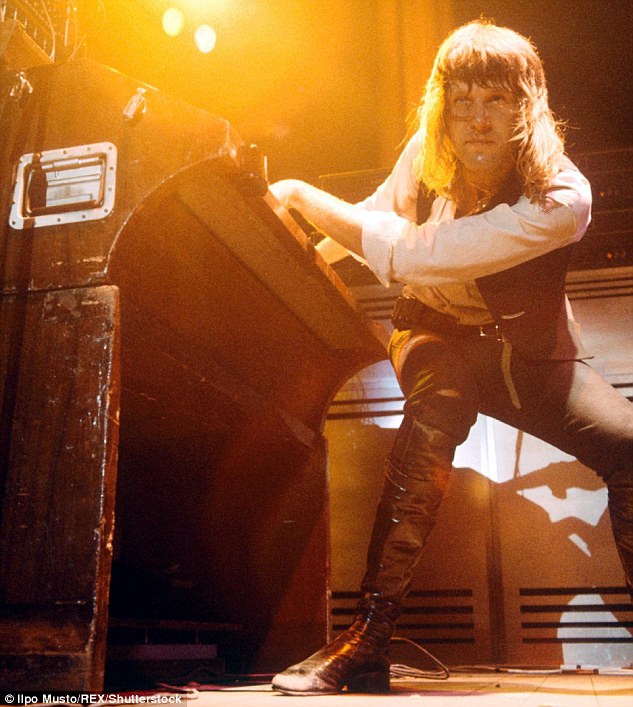 Fans at ELP concerts, prior to health and safety codes for dangerous decibel levels, would frequently say the stacks of speakers on stage literally blew their hair and clothing. Working in radio entertainment, going to concerts like ELP and being my department’s Rangemaster all contributed to my loss of hearing.
Fans at ELP concerts, prior to health and safety codes for dangerous decibel levels, would frequently say the stacks of speakers on stage literally blew their hair and clothing. Working in radio entertainment, going to concerts like ELP and being my department’s Rangemaster all contributed to my loss of hearing.
In the 1970s, the three-man progressive rock group Emerson, Lake and Palmer (or ELP) were on top of the record charts time and again. I attended three of their concerts and marveled at their musical chops as well as their stage theatrics.
Here is one of their most moving and recognizable songs, Lucky Man.
ELP consisted of Keith Emerson on keyboards, Carl Palmer on percussion and Greg Lake on stringed instruments.
The question I have is this: why wasn’t Keith Emerson’s passing more widely covered not just in the general media, but more broadly in the music industry as well?
Further, I found this somewhat disconsolate article in UK media, from the DailyMail.com:
How the Hendrix of the keyboard was trolled to death by his own fans: Keith Emerson’s widow claims flamboyant showman was a ‘sensitive soul’ killed himself after taking cruel jibes to heart
by Tom Leonard
- Keith Emerson died aged 71 at his home in Santa Monica, Los Angeles
- Police said he died from self-inflicted gunshot wound to the head
- Emerson set up the band in 1970 with guitarist Lake and drummer Palmer
- He had been planning to retire after a string of concerts in Japan
- But was ‘tormented with worry’ that he wouldn’t be good enough
Emerson died aged 71 at his home in Santa Monica, Los Angeles, on Friday morning from what police said was a self-inflicted gunshot wound to the head.
It appears that for all his rock dinosaur image, he was the victim of a very modern fate — ‘trolled to death’ by heartless fans who had attacked him online over the quality of his recent music, even suggesting he gave up.
In fact, he had been suffering for years from a debilitating muscular condition that affected the fingers in his right hand.
‘He read all the criticism online and was a sensitive soul,’ said his Japanese girlfriend, Mari Kawaguchi, 52.
Although he had been planning to retire after a string of upcoming concerts in Japan, he was ‘tormented with worry’ that he wouldn’t be good enough, she said. ‘He didn’t want to let down his fans. He was a perfectionist and the thought he wouldn’t play perfectly made him depressed, nervous and anxious.’
It’s easy to believe that he could have been deeply troubled by the cruel barbs from fans. Not only did Emerson take his music very seriously — even if many others didn’t — but he was a deeply sensitive man who was far from the wild rock star that he appeared on stage.
‘Keith was a gentle soul whose love for music and passion for his performance as a keyboard player will remain unmatched for many years to come,’ said his former bandmate, Carl Palmer.
These parts I clearly remember, with fondness:
If ELP records were bombastic enough, the band’s live appearances were something else. The group toured with 40 tons of equipment, the vast expense justified only by the fact that no one except The Rolling Stones, The Who and Led Zeppelin drew bigger live crowds. It included 13 keyboards and a £2,000 Persian rug that Greg Lake stood on while he played.
Emerson was always centre stage and would be hoisted on a wire 20ft into the air while strapped to a Steinway grand piano. He would then play the instrument while it spun end over end as smoke billowed around him. Finally, in a huge explosion from fireworks inside the piano, it and Emerson would disappear.
The stunt had eventually to stop because Emerson kept getting hurt: once he broke his nose when the piano suddenly stopped mid-spin; another time, the fireworks went off too soon and he was covered in cuts and bruises. Down on stage, the carnage was intense. At that inaugural Isle of Wight performance, a photographer was hurled off stage into the audience by the force of antique cannons firing at the end of one song.
I had the fortunate occasion to see the spinning piano stunt twice — luckily with no broken bones or lacerations involved.
Yes, ELP was bombastic; yes, ELP was excessive. Yes, some persons made fun of them for their over-the-top theatrics and what the Swedish call självdistans, or lack of distance. Taking oneself a bit too seriously.
There is no denying that Keith Emerson possessed an amazing aptitude and, like many talents in entertainment with a cutting creative side, could be occasionally confused, sensitive, depressed and desperate. We’ve all been there.
Tragically, Keith Emerson succumbed to those voices ended his life.
BZ


